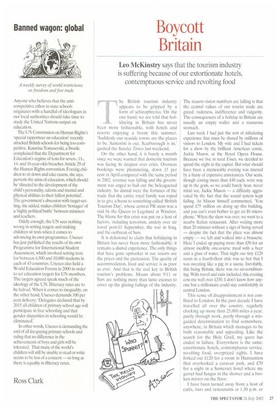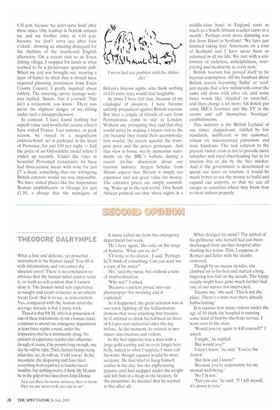Boycott Britain
Leo McKinstry says that the tourism industry is suffering because of our extortionate hotels, contemptuous service and revolting food
he British tourism industry appears to be gripped by a form of schizophrenia. On the one hand, we are told that holidaying in Britain has never been more fashionable, with hotels and resorts enjoying a boom this summer. 'Suddenly our seaside towns are the places to be. Santorini is out. Scarborough is in,' gushed the Sunday Times last weekend.
On the other hand, it is barely a month since we were warned that domestic tourism was facing its deepest ever crisis, Overseas bookings were plummeting, down 15 per cent in April compared with the same period in 2002, revenue was falling and the government was urged to bail out the beleaguered industry. So dismal were the fortunes of the trade that the entire royal family was roped in to give a boost to something called 'British Tourism Day', whose central PR stunt was a visit by the Queen to Legoland at Windsor, The blame for this crisis was put on a host of factors, including terrorism, anxiety over air travel post-11 September, the war in Iraq, and the outbreak of Sars.
It is delusional to claim that holidaying in Britain has never been more fashionable; it remains a dismal experience. The only things that have gone upmarket in our resorts are the prices and the pretension. The quality of accommodation, food and service is as poor as ever. And that is the real key to British tourism's problems. Moans about 9/11 or Sars are nothing more than lame excuses to cover up the glaring failings of the industry. The reason visitor numbers are falling is that the central values of our tourist trade are greed, rudeness, indifference and vulgarity. The consequences of a holiday in Britain are usually an empty wallet and a nauseous stomach.
Last week I had just the sort of infuriating experience that must be shared by millions of visitors to London. My wife and I had tickets for a show by the brilliant American comic, Jackie Mason, at the Royal Opera House. Because we live in rural Essex, we decided to spend the night in the capital. But what should have been a memorable evening was marred by a litany of expensive annoyances. Our seats, though costing more than £40 each, were way up in the gods, so we could barely hear, never mind see, Jackie Mason — a difficulty aggravated by the fact that the sound system kept failing. As Mason himself commented, You spend £75 million on doing up this building, and you can't even bother to get an $8 microphone.' When the show was over, we went to a nearby Italian restaurant After waiting more than 20 minutes without a sign of being served — despite the fact that the place was almost empty — we left and walked into a brasserie. Here I ended up paying more than £50 for an almost inedible one-course meal with a beer and a glass of water. That night our tiny £128 room in a fourth-floor attic was so hot that I was sweating like a pig in a sauna. Inevitably, this being Britain, there was no air-conditioning. With travel and taxis included, this evening cost me well over £330. I don't know how anyone but a millionaire could stay comfortably in central London.
This sense of disappointment is not confined to London. In the past decade I have travelled all over the country, regularly clocking up more than 25,000 miles a year, partly through work, partly through a misguided determination to find somewhere, anywhere, in Britain which manages to be both reasonable and appealing. Like the search for the Holy Grail, my quest has ended in failure. Everywhere is the same: extortionate hotels, contemptuous service, revolting food, overpriced sights. I have forked out £120 for a room in Hunstanton that overlooked a caravan park, and £70 for a night in a Somerset hotel where my garret had fungus in the shower and a broken mirror on the floor.
I have been turned away from a host of cafes, bars and restaurants at 1.30 p.m. or 8.30 p.m. because 'we don't serve food' after those times. One teashop in Norfolk refused me and my brother entry at 4.10 p.m. because 'we don't serve tea after four o'clock', showing an amazing disregard for the rhythms of the traditional English afternoon. On a recent visit to an Essex fishing village, I stopped for lunch at what seemed to be a picturesque quayside pub. When my cod was brought out, wearing a layer of batter so thick that it should have required planning permission from Essex County Council. I gently inquired about cutlery. The sneering, spotty teenage waitress replied. 'Inside. Get it yourself. This isn't a restaurant, you know.' There was never the slightest danger of my falling under such a misapprehension.
In contrast. I have found nothing but superb value and wonderful cuisine when I have visited France. Last summer, in peak season, we stayed in a magnificent château-hotel, set in parkland in the heart of Provence, for just £50 per night — half the price of an Oxfordshire motel where I ended up recently. Under the vines in beautiful Provencal restaurants we have had three-course meals with wine for just £7 a head, something that our whingeing British caterers would say was impossible. We have visited places like the stupendous Roman amphitheatre in Orange for just £1.50, a charge that the managers of
Britain's historic sights, who think nothing of £10 entry fees, would find laughable.
At times I have felt that, because of my catalogue of disasters, I have become unfairly prejudiced against British tourism. But then a couple of friends of ours from Pennsylvania came to stay in London. Without any prompting they said that they would never be making a return visit to the city because they found their accommodation woeful, the streets squalid, the transport poor and the prices grotesque. And that view is borne out by numerous statements on the BBC's website during a recent on-line discussion about our tourism industry. Jurgen Schulze from Miami argued that 'Britain is simply too expensive and not good value for money. The entrance prices are simply astonishing. Wake up to the real world.' One South African pointed out that 'three nights in a middle-class hotel in England costs as much as a South African teacher earns in a month'. Perhaps even more damning was this from Hazel in Scotland: 'We have just finished taking four Americans on a tour of Scotland and I have never been so ashamed in all my life. We met with a uniformity of rudeness, unhelpfulness, overpricing and mediocrity at every turn.'
British tourism has proved itself to be beyond redemption. All the bombast about British resorts becoming 'funky' or 'cool' just means that a few restaurants cover the same old dross with olive oil, add some fancy words like 'drizzled' or 'corn-fed', and then charge a lot more. Or hotels put some IKEA furniture and Sky TV in the rooms and call themselves 'boutique' establishments.
This industry is the British Leyland of our times: clapped-out, riddled by low standards, indifferent to the customer, reliant on misconceived patriotism and state handouts. The real solution to the present visitor crisis is not to provide more subsidies and royal cheerleading but to let tourism live or die by the free market. And if the government is determined to spend our taxes on tourism, it would be much better to use the money to build and expand our airports, so that we can all escape to countries where they know how to treat visitors properly.



























































 Previous page
Previous page